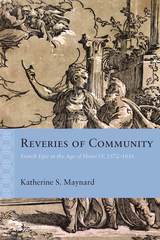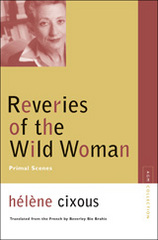3 books about Reveries

Reveries of Community
French Epic in the Age of Henri IV, 1572–1616
Katherine S. Maynard
Northwestern University Press, 2018
Reveries of Community reconsiders the role of epic poetry during the French Wars of Religion, the series of wars between Catholics and Protestants that dominated France between 1562 and 1598. Critics have often viewed French epic poetry as a casualty of these wars, arguing that the few epics France produced during this conflict failed in power and influence compared to those of France’s neighbors, such as Italy’s Orlando Furioso, England’s Faerie Queene, and Portugal’s Os Lusíadas. Katherine S. Maynard argues instead that the wars did not hinder epic poetry, but rather French poets responded to the crisis by using epic poetry to reimagine France’s present and future.
Traditionally united by une foi, une loi, un roi (one faith, one law, one king), France under Henri IV was cleaved into warring factions of Catholics and Huguenots. The country suffered episodes of bloodshed such as the St. Bartholomew’s Day Massacre, even as attempts were made to attenuate the violence through frequent edicts, including those of St. Germain (1570) and Nantes (1598). Maynard examines the rich and often dismissed body work written during these bloody decades: Pierre de Ronsard’s Franciade, Guillaume Salluste Du Bartas’s La Judit and La Sepmaine, Sébastian Garnier’s La Henriade, Agrippa d’Aubigné’s Les Tragiques, and others. She traces how French poets, taking classics such as Virgil’s Aeneid and Homer’s Iliad as their models, reimagined possibilities for French reconciliation and unity.
Traditionally united by une foi, une loi, un roi (one faith, one law, one king), France under Henri IV was cleaved into warring factions of Catholics and Huguenots. The country suffered episodes of bloodshed such as the St. Bartholomew’s Day Massacre, even as attempts were made to attenuate the violence through frequent edicts, including those of St. Germain (1570) and Nantes (1598). Maynard examines the rich and often dismissed body work written during these bloody decades: Pierre de Ronsard’s Franciade, Guillaume Salluste Du Bartas’s La Judit and La Sepmaine, Sébastian Garnier’s La Henriade, Agrippa d’Aubigné’s Les Tragiques, and others. She traces how French poets, taking classics such as Virgil’s Aeneid and Homer’s Iliad as their models, reimagined possibilities for French reconciliation and unity.
[more]

The Reveries of the Solitary Walker, Botanical Writings, and Letter to Franquières
Jean-Jacques Rousseau
Dartmouth College Press, 2000
“I am now alone on earth, no longer having any brother, neighbor, friend, or society other than myself” proclaimed Rousseau in Reveries of the Solitary Walker. Reveries, along with Botanical Writings and Letter to Franquières, were all written at the end of his life, a period when Rousseau renounced his occupation as author and ceased publishing his works. Presenting himself as an unwilling societal outcast, he nonetheless crafted each with a sharp eye on his readership. Whether addressing himself, a mother hoping to interest her child in botany, or a confused young nobleman, his dialogue reflects the needs of his interlocutor and of future readers. Although very different in style, these three works concern overlapping subjects. Their unity comes from the relation of the other writings to the Reveries, which consists of ten meditative “walks” during which Rousseau considers his life and thought. The third and fourth walks discuss truth, morality, and religious belief, which are the themes of the Letter to Franquières; while the seventh is a lengthy discussion of botany as a model for contemplative activity. The overarching themes of the volume—the relations among philosophic or scientific contemplation, religion, and morality—provide Rousseau’s most intimate and final reflections on the difficulties involved in understanding nature.
[more]

Reveries of the Wild Woman
Primal Scenes
Helene Cixous
Northwestern University Press, 2006
All the time when I lived in Algeria, my native country,
I dreamt of one day arriving in Algeria.
Born in Oran, Algeria, Hélène Cixous spent her childhood in France's former colony. Reveries of the Wild Woman is her visceral memoir of a preadolescence that shaped her with intense feelings of alienation, yet also contributed, in a paradoxically essential way, to her development as a writer and philosopher.
Born to a French father and an Austro-German mother, both Jews, Cixous experienced a childhood fraught with racial and gender crisis. In her moving story she recounts how small events--a new dog, the gift of a bicycle--reverberate decades later as symbols filled with social and psychological meaning. She and her family endure a double alienation, by Algerians for being French and by the French for being Jewish, and Cixous builds her story on the themes of isolation and exclusion she felt in particular under the Vichy government and during the Algerian Civil War. Yet she also concedes that memories of Algeria awaken in her a longing for her home country, and ponders how that stormy relationship has influenced her life and thought.
A meditation on postcolonial identity and gender, Reveries of the Wild Woman is also a poignant recollection of how a girl's childhood is, indeed, author to the woman.
I dreamt of one day arriving in Algeria.
Born in Oran, Algeria, Hélène Cixous spent her childhood in France's former colony. Reveries of the Wild Woman is her visceral memoir of a preadolescence that shaped her with intense feelings of alienation, yet also contributed, in a paradoxically essential way, to her development as a writer and philosopher.
Born to a French father and an Austro-German mother, both Jews, Cixous experienced a childhood fraught with racial and gender crisis. In her moving story she recounts how small events--a new dog, the gift of a bicycle--reverberate decades later as symbols filled with social and psychological meaning. She and her family endure a double alienation, by Algerians for being French and by the French for being Jewish, and Cixous builds her story on the themes of isolation and exclusion she felt in particular under the Vichy government and during the Algerian Civil War. Yet she also concedes that memories of Algeria awaken in her a longing for her home country, and ponders how that stormy relationship has influenced her life and thought.
A meditation on postcolonial identity and gender, Reveries of the Wild Woman is also a poignant recollection of how a girl's childhood is, indeed, author to the woman.
[more]
READERS
Browse our collection.
PUBLISHERS
See BiblioVault's publisher services.
STUDENT SERVICES
Files for college accessibility offices.
UChicago Accessibility Resources
home | accessibility | search | about | contact us
BiblioVault ® 2001 - 2024
The University of Chicago Press









